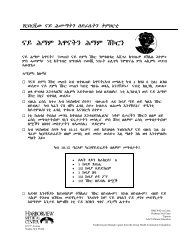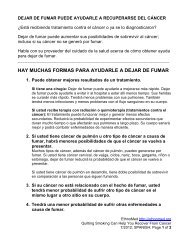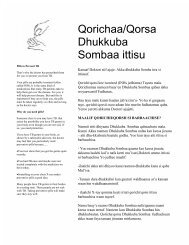Somali Knowledge Attitude Practices Study (KAPS) - EthnoMed
Somali Knowledge Attitude Practices Study (KAPS) - EthnoMed
Somali Knowledge Attitude Practices Study (KAPS) - EthnoMed
You also want an ePaper? Increase the reach of your titles
YUMPU automatically turns print PDFs into web optimized ePapers that Google loves.
ATTITUDES AND BELIEFS ON BREASTFEEDING<br />
The study found a common belief among more than 50% of the women in all livelihood zones in<br />
South and Central Zone that there is no milk produced in the breast until the 3 rd day after delivery.<br />
Another common belief in all livelihood zones related to lack of breast milk was that nipples are<br />
blocked and cannot produce milk during the first 3 days after delivery. Everyone in all livelihood<br />
zones also believes that breast feeding should not stop until the child is two (2) years old. To<br />
almost all women in South Central <strong>Somali</strong>a, exclusive breastfeeding does not exist.<br />
Initiation of Breastfeeding<br />
Among the pastoralists, initiation of breastfeeding does not take place in the 1 st three days after<br />
delivery due to the belief that the baby needs water to remove air and mucus that was swallowed<br />
in the womb and during the birth process. Majority of the pastoralists also believe that<br />
breastfeeding during the first three days cause diarrhoea in children and the pain experienced by<br />
mothers as they try to breastfeed could result in maternal death after delivery. It was also found<br />
that women avoid breastfeeding during the first three days of delivery due to the belief that<br />
breastfeeding soon after birth increases the size of breasts, and their men detest big breasts.<br />
More than 70% of agro-pastoral mothers also believe that there is no milk in the breast in the first<br />
three days and that the nipples are still blocked and unable to produces milk. In the riverine<br />
community, over 70% of women also believe that there is no milk until the third day after<br />
delivery. Similar beliefs of lack of milk in the breast in the first three days after delivery and that<br />
the nipples are not yet open are also found among over 50% of the urban population who do not<br />
believe in initiating breastfeeding immediately after delivery.<br />
Colostrum Milk<br />
The pastoralists believe that colostrum is heavy, thick and coarse, hence babies cannot swallow.<br />
The colostrums is also believed to be dirty and toxic, with no health benefits and can cause illness<br />
in children. believe it is heavy, thick and not good for the child. In Gedo, it is believed that<br />
colostrums is not good for the baby as it causes stomach pain and diarrhoea, hence should be<br />
‘rinsed out’. About 10% mothers in agro-pastoral livelihood however believe that colostrums<br />
protects children against illnesses, but that it does not come until the third day after delivery. In<br />
the riverine, it was reported that maternal grandmothers believe that colostrums is heavy, thick<br />
and unhealthy for children. These grandmothers tend to have a strong influence on their daughters<br />
and other women of reproductive age group not to feed children on colostrums.<br />
In urban communities, the common belief that colostrums is poisonous and causes diarrhoea in<br />
children also exists. However, the urban women, both elderly and child bearing age, who have<br />
attended the World Breastfeeding Week Celebrations, hold a different opinion on colostrums.<br />
About 10-15% of them believe that colostrum is good and makes baby healthy, strong and active.<br />
“A breastfed baby is always healthy”.<br />
Use of Water and other Liquids alongside Breastfeeding<br />
Majority of people in all livelihood zones believe that a child cannot survive without water, and<br />
that breast milk alone is not enough for the baby. Water and animal milk must therefore be given<br />
alongside breastfeeding right from birth. The pastoralists believe that water must also be given<br />
whenever a child cries because of the belief that should the child cry and die, the child will report<br />
the mother to God. The agro-pastoralists also believe that a child cannot survive without water.<br />
Majority of women in the riverine also believe that a child who is exclusively breastfed becomes<br />
deaf (Dhagol). Water and other forms of milk must therefore be given alongside breastfeeding to<br />
avoid development of deafness in the child.<br />
21






